Rhode Island Documents
Quitclaim Deed
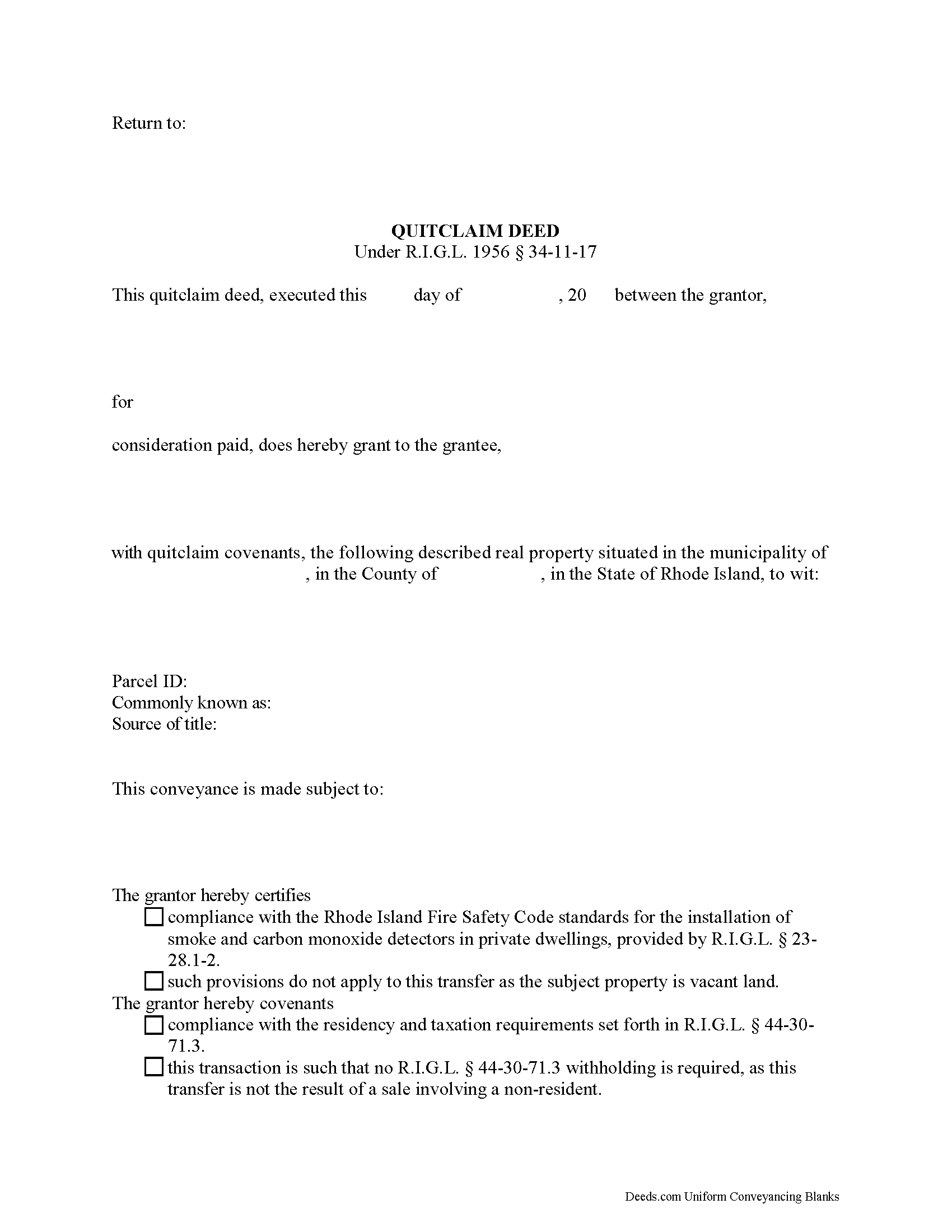
Rhode Island, like many New England states, does not have a county government system. Real estate deeds are recorded with the town or city clerk where the property is located. The grantor is required to sign the quitclaim deed, along with the notary public. Both signatures must have corresponding names printed beneath them (34-11-1.1). The grantee's address must also be included in the quitclaim deed. Failure to comply does not invalidate the recording, but the city or town clerk can refuse the quitclaim deed if this requirement is not met (34-11-1.2)
According to Title 34-11-1 of the Rhode Island General Laws, any conveyance, including a quitclaim deed, is required to be in writing and recorded; however, if it is delivered as between the parties and their heirs or those having notice of it, it is valid, binding, and sufficient to pass title even though it is not acknowledged or recorded. If a quitclaim deed is signed and delivered by the grantor, it will convey to the grantee all that the grantor is lawfully able to convey without any other act or ceremony. Once recorded and acknowledged, it is operative against third parties (34-11-4). Recording a quitclaim deed provides cons... More Information about the Rhode Island Quitclaim Deed
Gift Deed
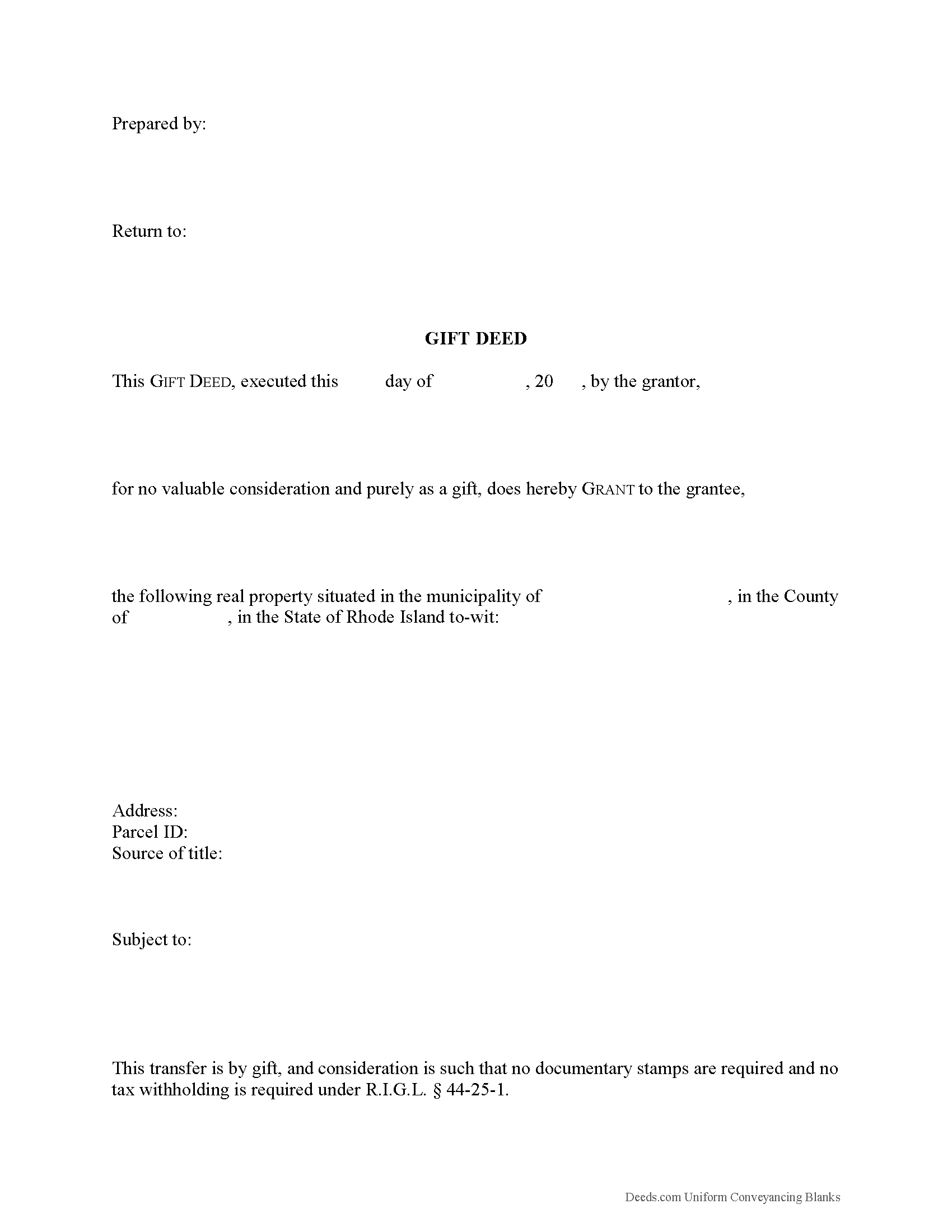
Gifts of Real Property in Rhode Island
A gift deed, or deed of gift, is a legal document voluntarily transferring title to real property from one party (the grantor or donor) to another (the grantee or donee). A gift deed typically transfers real property between family or close friends. Gift deeds are also used to donate to a non-profit organization or charity. The deed serves as proof that the transfer is indeed a gift and without consideration (any conditions or form of compensation).
Valid deeds must meet the following requirements: The grantor must intend to make a present gift of the property, the grantor must deliver the property to the grantee, and the grantee must accept the gift. A gift deed must contain language that explicitly states no consideration is expected or required, because any ambiguity or reference to consideration can make the deed contestable in court. A promise to transfer ownership in the future is not a gift, and any deed that does not immediately transfer the interest in the property, or meet any of the aforementioned requirements, can be revoked [1].
A lawful gift deed includes the grantor's full name and marital status, as well as the grante... More Information about the Rhode Island Gift Deed
Warranty Deed
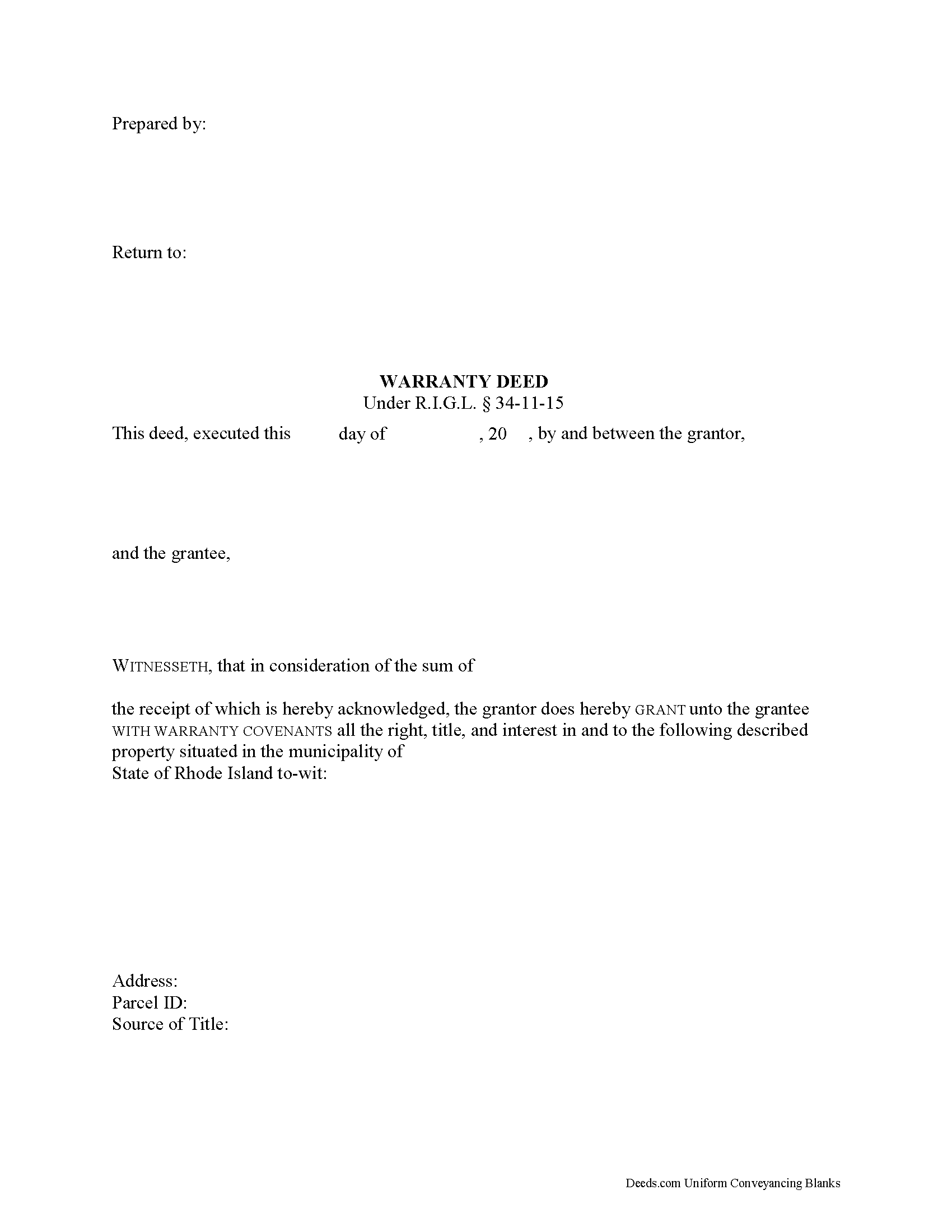
In Rhode Island, title to real property can be transferred from one party to another by recording a warranty deed. A warranty deed conveys an interest in real property to the named grantee with full warranties of title.
Warranty deeds are statutory in Rhode Island under R.I.G.L. 34-11-15, and they convey real property in fee simple with the most assurance of title. When the words "with warranty covenants" are included in the conveyancing clause, the following covenants are implied: the grantor guarantees that he or she holds title to the property and has good right to convey it; that the property is free from encumbrances (with the exception of any noted in the deed); and that the grantor will defend the title against all claims (R.I.G.L. 34-11-16). This warranty of title is greater than that of a limited or special warranty deed, which guarantees the title only against claims that arose during the time the grantor held title to the property, or a quitclaim deed, which offers no warranties of title.
A lawful warranty deed includes the grantor's full name, mailing address, and marital status; the consideration given for the transfer; and the grantee's full name, mailing addre... More Information about the Rhode Island Warranty Deed
Special Warranty Deed
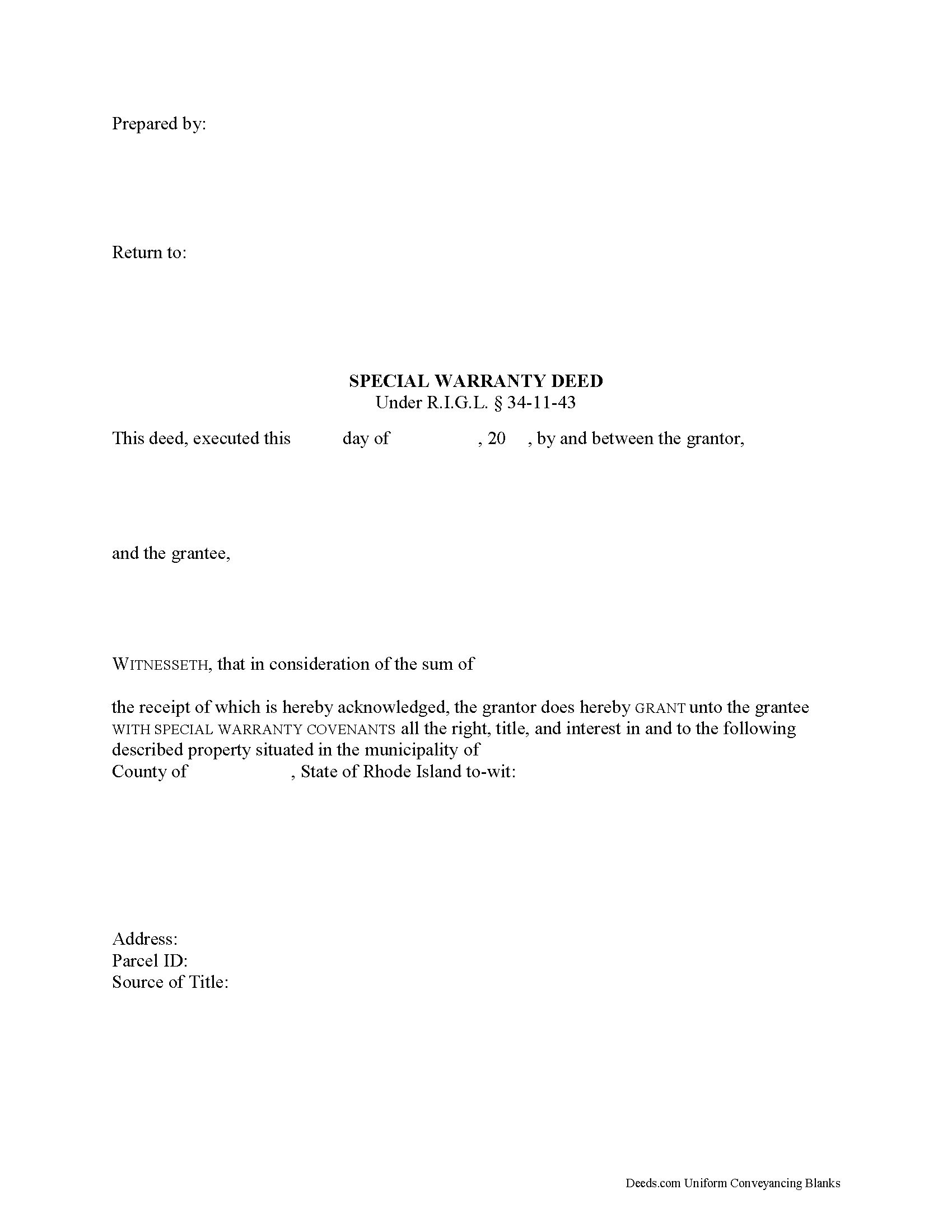
In Rhode Island, title to real property can be transferred from one party to another by recording a special warranty deed. A special warranty deed conveys an interest in real property to the named grantee with limited warranties of title.
Special warranty deeds are statutory in Rhode Island under R.I.G.L. 34-11-43. When the words "special warranty" are used in the title of the deed, or the phrase "with special warranty covenants" is included in the conveyancing clause, the following covenants are implied: the grantor guarantees that he or she holds title to the property and has good right to convey it; that the property is free from encumbrances (with the exception of any noted in the deed); and that the grantor will "warrant and defend" the title against the claims of anyone "by, through, or under the grantor" (R.I.G.L. 34-11-16, 34-11-44). Unlike a general warranty deed, which conveys property with full warranties of title, a special warranty deed only protects the grantee (buyer) against claims that arose during the time the grantor held title to the property.
A lawful special warranty deed includes the grantor's full name, mailing address, and marital status; the consid... More Information about the Rhode Island Special Warranty Deed
Grant Deed
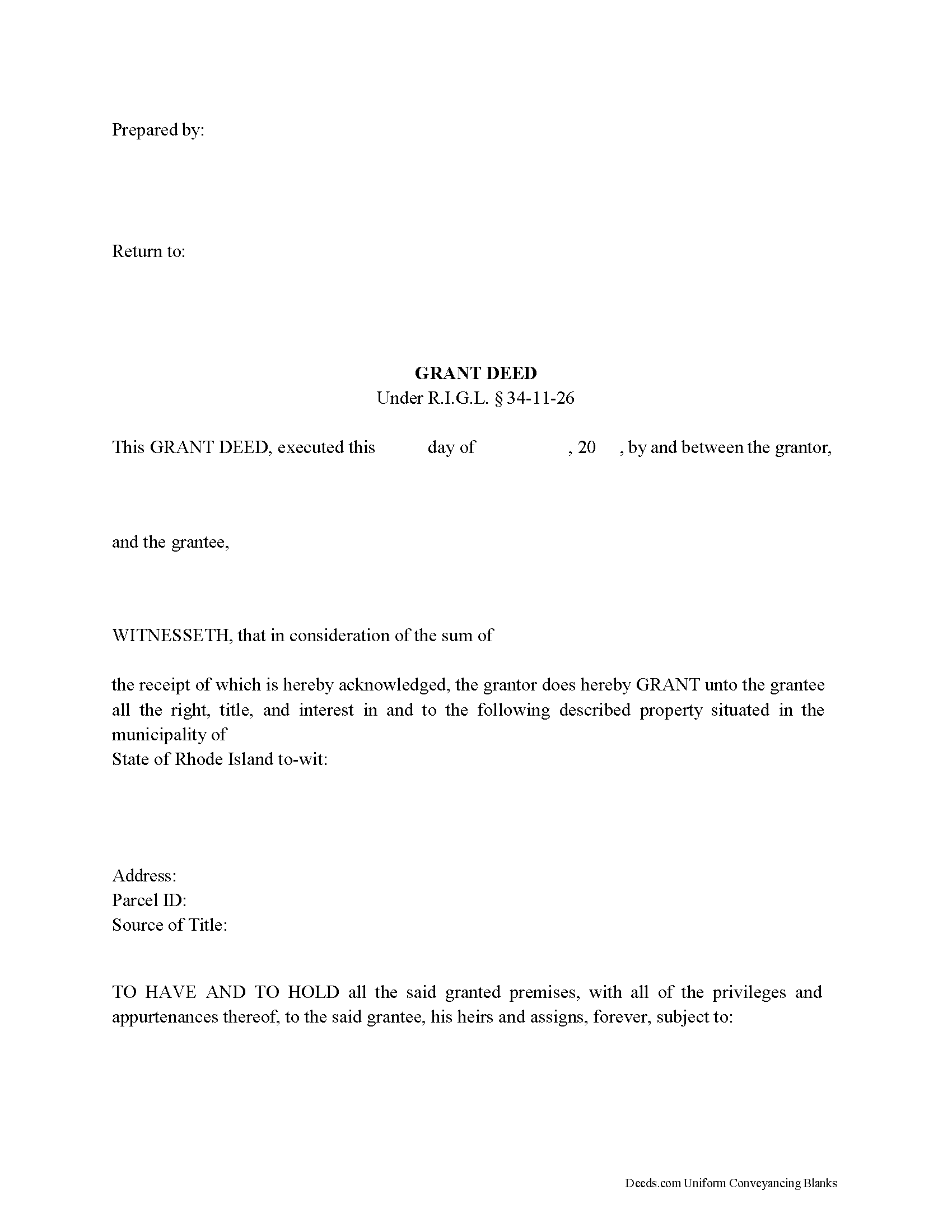
In Rhode Island, title to real property can be transferred from one party to another by executing a grant deed. Use a grant deed to transfer a fee simple interest with covenants that the title is free of any encumbrances (except for those stated in the deed) and that the grantor holds an interest in the property and is free to convey it. The word "grant" is considered a "sufficient word of conveyance" in any transfer of title in fee simple, but it does not imply any covenant or warranty (R.I.G.L. 34-11-26). Any covenants of title should be explicitly made in the form of the conveyance.
A lawful grant deed includes the grantor's full name, mailing address, and marital status; the consideration given for the transfer; and the grantee's full name, mailing address, marital status, and vesting. Vesting describes how the grantee holds title to the property. Generally, real property is owned in either sole ownership or in co-ownership. For Rhode Island residential property, the primary methods for holding title are tenancy in common, joint tenancy, and tenancy by entirety. A conveyance of real estate to two or more persons creates a tenancy in common, unless otherwise specified in the ... More Information about the Rhode Island Grant Deed
Correction Deed
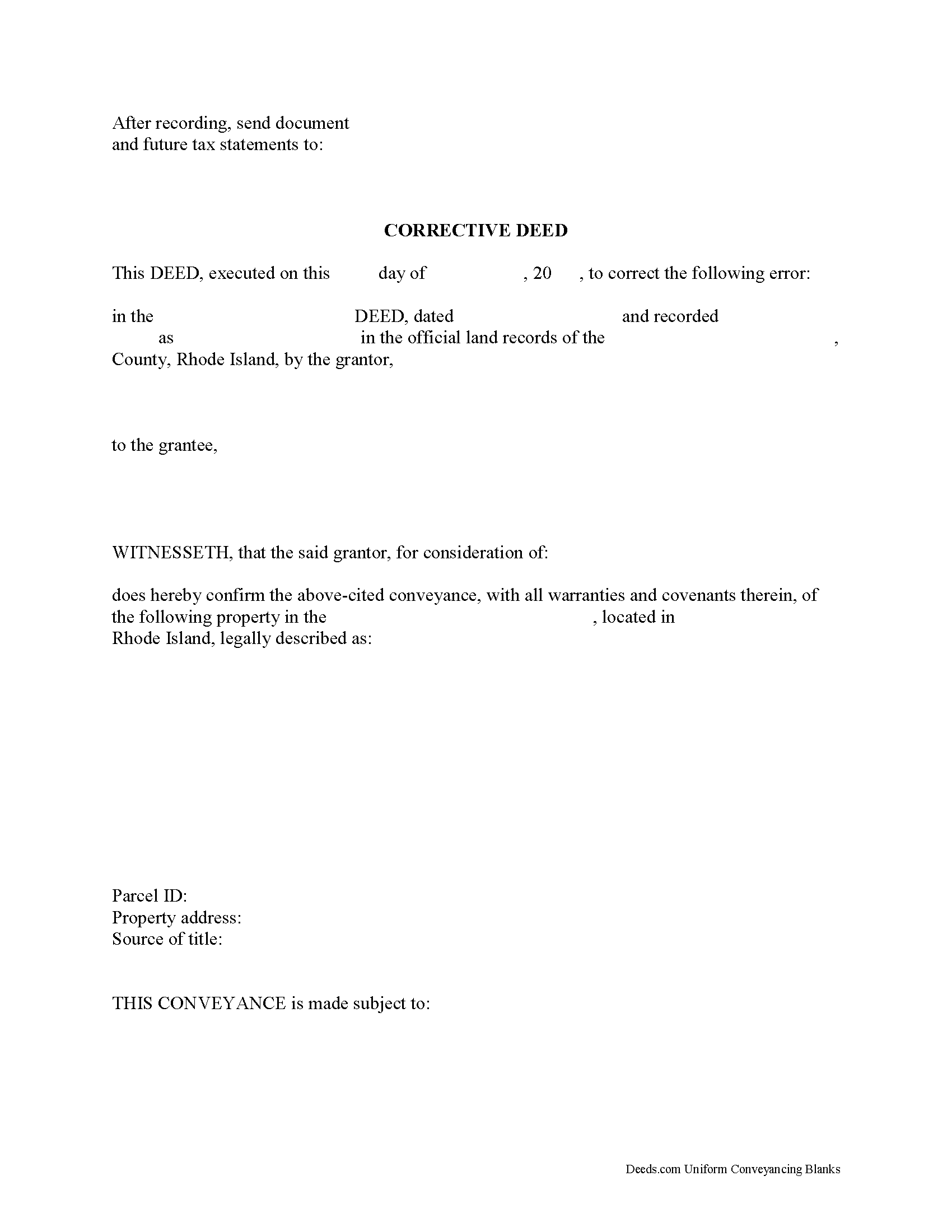
Use the corrective deed to correct an error in a previously recorded deed of conveyance in Rhode Island.
Correcting an error in a recorded deed helps prevent problems that might arise when the current owner tries to sell the property. The best method for correction is to prepare and record a new document, a so-called corrective deed. This document does not convey title; instead, it confirms the prior conveyance of the property.
Apart from supplying the correct information, the new deed must state the reason for correcting, and it must reference the prior deed by title, date, and recording number. The original grantor must sign again, thus confirming the conveyance to the same grantee. Generally, corrective deeds are used to address minor errors in a deed, such as typos, accidentally omitted suffixes or middle initials in names, and other minor omissions. A defect in the acknowledgment might also be corrected with such a deed. When in doubt about the gravity of an error, consult with a lawyer.
For certain changes, a correction deed may not be appropriate. Adding or removing a grantee, for example, or altering the manner in which title is held, or making material changes to... More Information about the Rhode Island Correction Deed
Mortgage Security Agreement and Promissory Note
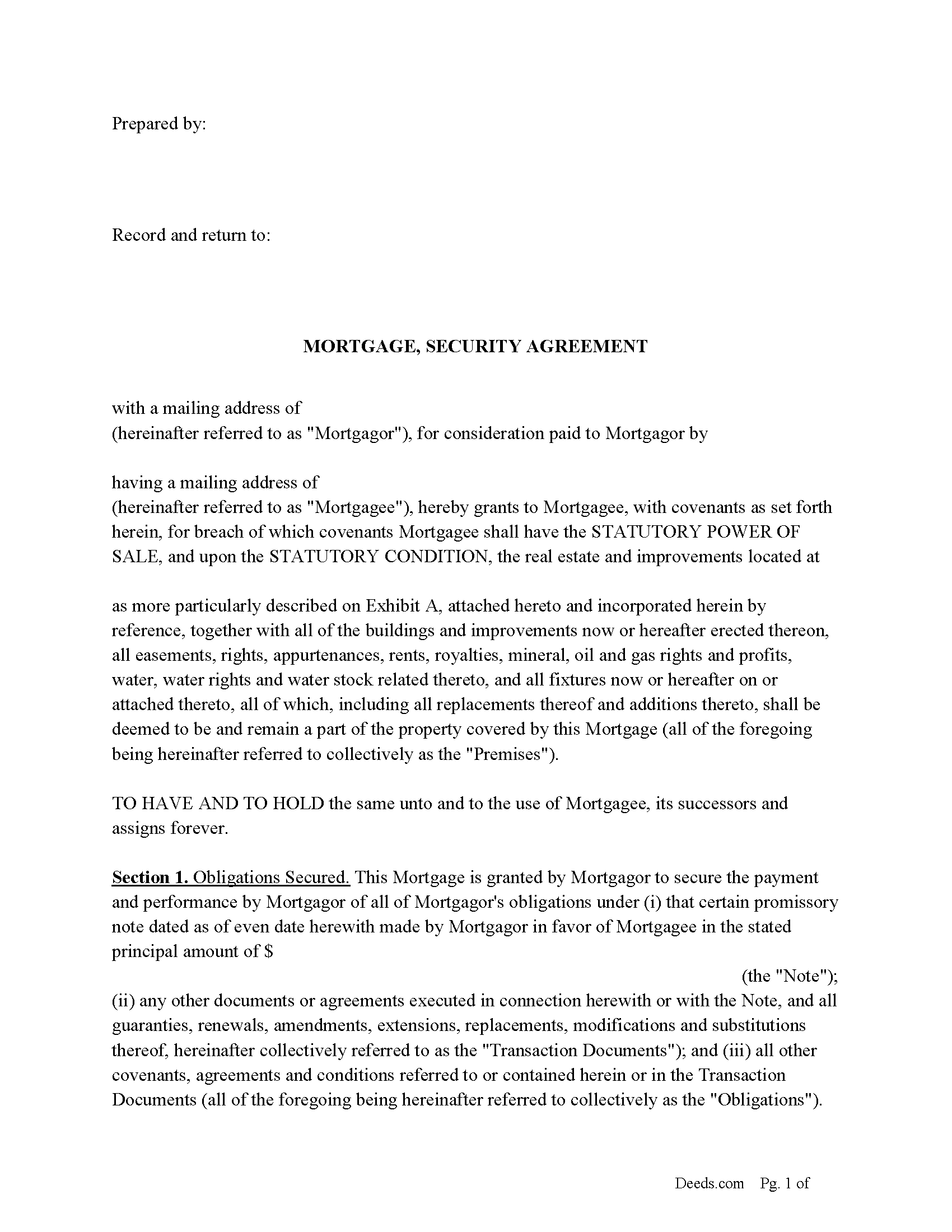
Use this mortgage form to finance real property, (residential, rental, small commercial, condominiums and planned unit developments) in the State of Rhode Island.
34-11-22. Statutory power of sale in mortgage.
The following power shall be known as the "statutory power of sale" and may be incorporated in any mortgage by reference:(Power)
But if default shall be made in the performance or observance of any of the foregoing or other conditions, or if breach shall be made of the covenant for insurance contained in this deed, then it shall be lawful for the mortgagee or his, her or its executors, administrators, successors or assigns to sell, together or in parcels, all and singular the premises hereby granted or intended to be granted, or any part or parts thereof, and the benefit and equity of redemption of the mortgagor and his, her or its heirs, executors, administrators, successors and assigns therein, at public auction upon the premises, or at such other place, if any, as may be designated for that purpose in this deed, or in the published notice of sale first by mailing written notice of the time and place of sale by certified mail, return receipt requested, to the mortgag... More Information about the Rhode Island Mortgage Security Agreement and Promissory Note
Discharge of Mortgage
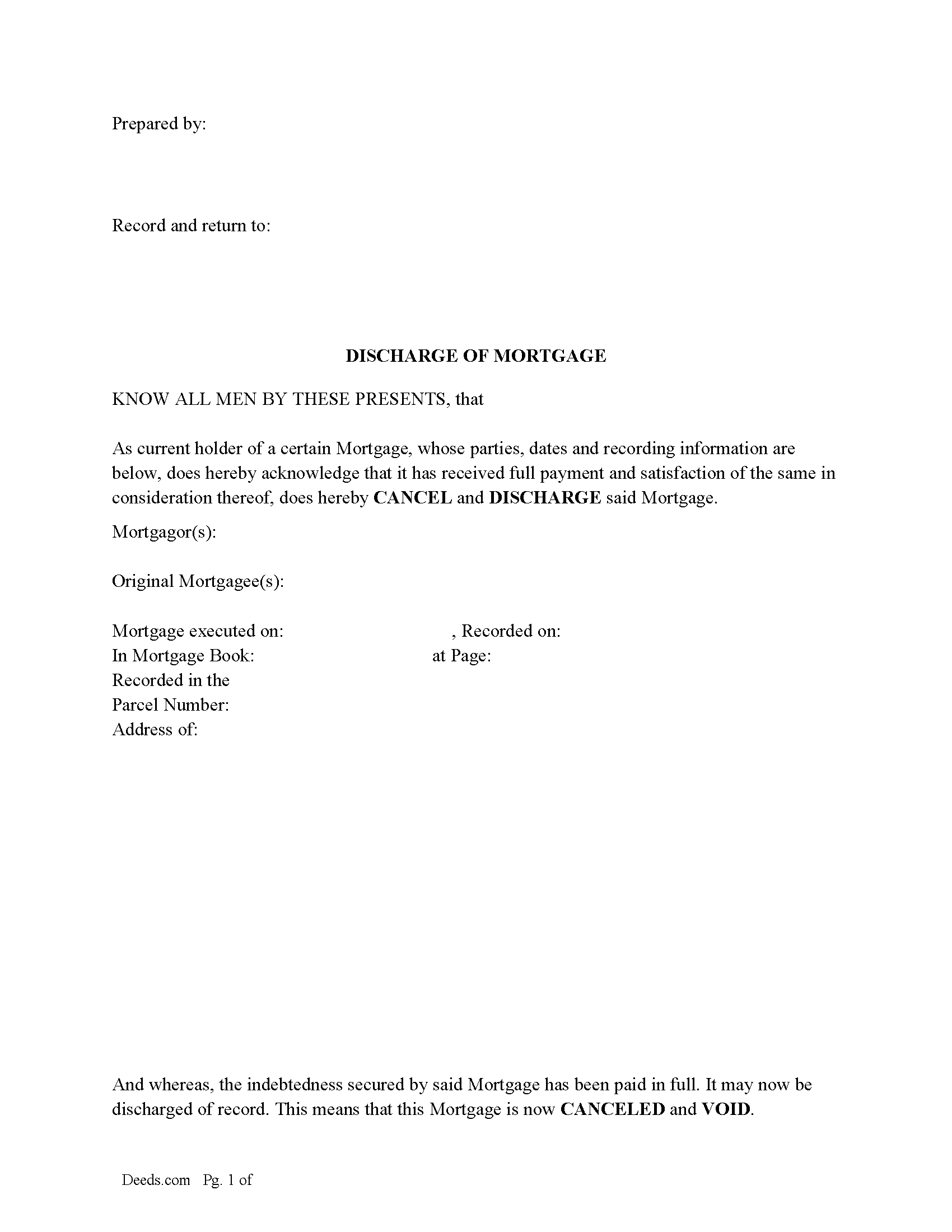
Use this form to discharge a previously recorded mortgage. Upon satisfaction, the mortgagee/lender generally has 30 days to record a discharge of mortgage to avoid penalty as stated in Statute 34-26-5. Liability of mortgagee for failure to discharge, release, or transfer mortgage.
Rhode Island General Laws Title 34. Property Statute 34-26-2. Right to discharge on satisfaction of mortgage--Escrow accounts
(a) Every mortgagee of real estate, his, her or its heirs, executors, administrators, successors, or assigns, having received full satisfaction for the money due on the mortgage, shall, within thirty (30) days after final payment, discharge the mortgage as provided in 34-26-3 or by separate instrument of release of the mortgage, and shall send the discharge to be recorded in the proper record book with suitable references to the original record, including the mortgagor's name and address, which shall forever afterwards discharge, defeat and release the mortgage and perpetually bar all actions to be brought thereon in any court. Upon forwarding the discharge for recording the mortgagee shall notify the mortgagor. Any mortgagor or his agent upon tendering final payment to the... More Information about the Rhode Island Discharge of Mortgage
Statutory Assignment of Mortgage
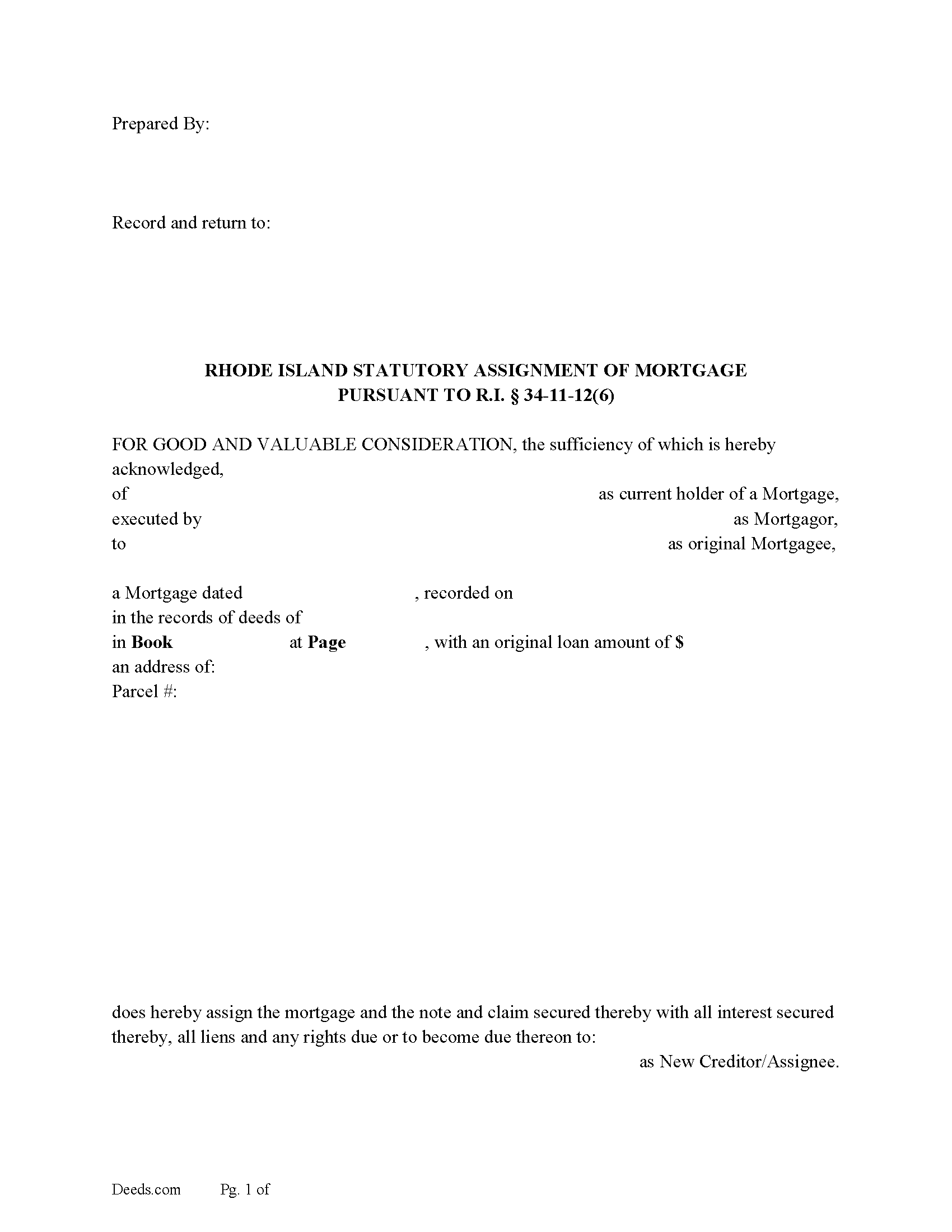
Use this form to transfer an existing mortgage. This is commonly executed when a mortgage is sold/transferred. This is a recordable Rhode Island (statutory form) and (may be altered as circumstances require). [The statutory forms referred to in R.I. 34-11-11 are as follows:
ASSIGNMENT OF MORTGAGE
Holder of a mortgage by
to
dated
recorded in the records of deeds in
in book no., / at page,
for consideration paid, assign the mortgage and the note and claim secured thereby
to
Witness hand this day of (Here add
acknowledgment.)] (R.I Statute 34-11-11). [RI Statute 34-11-12(6)]
(6) ASSIGNMENT OF MORTGAGE.
34-11-24. Effect of assignment of mortgage. An assignment of mortgage substantially following the form entitled "Assignment of Mortgage" shall, when duly executed, have the force and effect of granting, bargaining, transferring and making over to the assignee, his or her heirs, executors, administrators, and assigns, the mortgage deed with the note and debt thereby secured, and all the right, title and interest of the mortgagee by virtue thereof in and to the ... More Information about the Rhode Island Statutory Assignment of Mortgage
Easement Deed
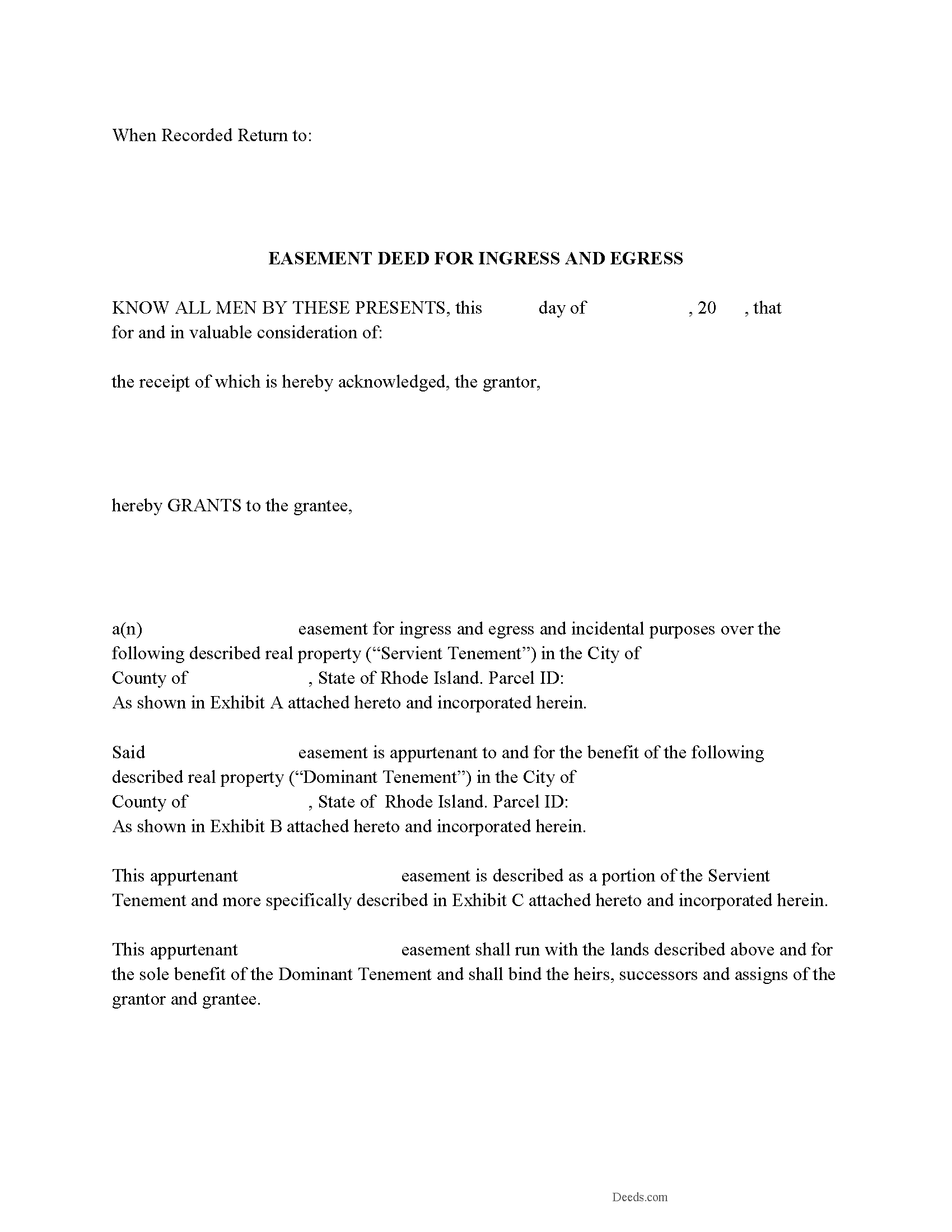
An easement can be created by an express easement, by implication, or by prescription. An express easement is clearly stated in a contract, deed, or will. An easement by implication occurs when the owner of a piece of land divides such land into smaller pieces and sells a smaller piece to another person, retaining a right to enter such piece of land. An easement by prescription arises through an individual's continued use of land as opposed to the possession thereof. A solar easement may be granted and conveyed in the same manner and with the same effect as a conveyance of an interest in real property in this state ( 34-40-2). In a conveyance of real estate in Rhode Island, all rights, privileges, and appurtenances belonging or appertaining to the granted estate shall be included in the conveyance, unless a different intention clearly appears in the deed ( 34-11-28). The easement deed creating the rights of usage should specify the terms and conditions of the easement.
An easement deed in Rhode Island is required to be in writing, duly signed, acknowledged, delivered, and recorded in the town or city where the property subject to the easement is located ( 34-11-1). A duly signe... More Information about the Rhode Island Easement Deed
Termination of Easement
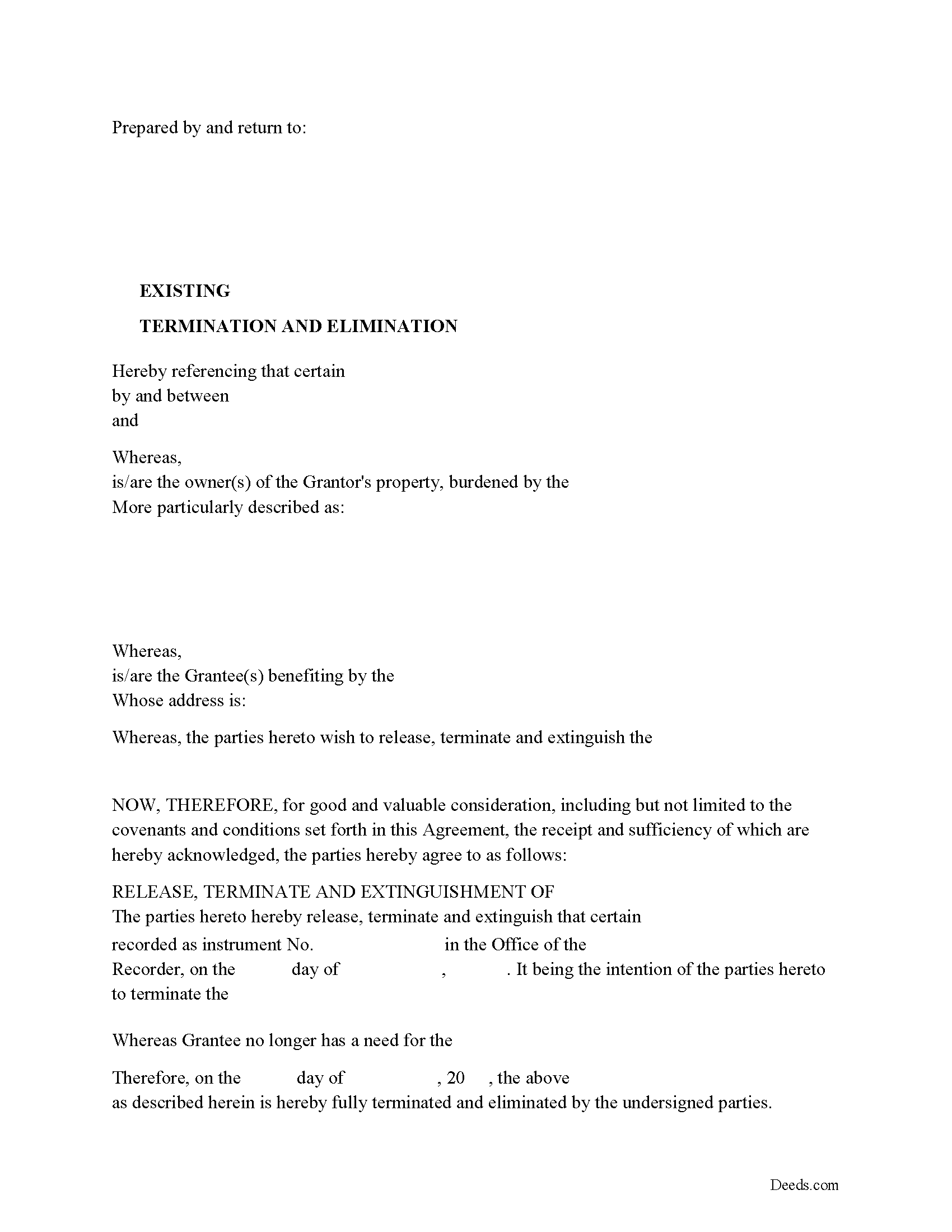
Use this form to release, terminate, extinguish a previously recorded document that involves access to and from a property.
Documents such as:
1. Easement Deeds or Agreements (An easement is a non-possessory interest in land, granting the right to use someone else's property for a specific purpose, like a driveway or utility line)
2. Access Roads
3. Right of Ways
4. Utility Easements (Power, Gas, Water, Sewer, Etc.)
5. Drainage Easements
This document allows the owner of the land, burdened by the access and the party that benefits from the access, to sign an agreement releasing the property from such access, ... More Information about the Rhode Island Termination of Easement
Notice of Lis Pendens - R.I. General Laws 9-4-9
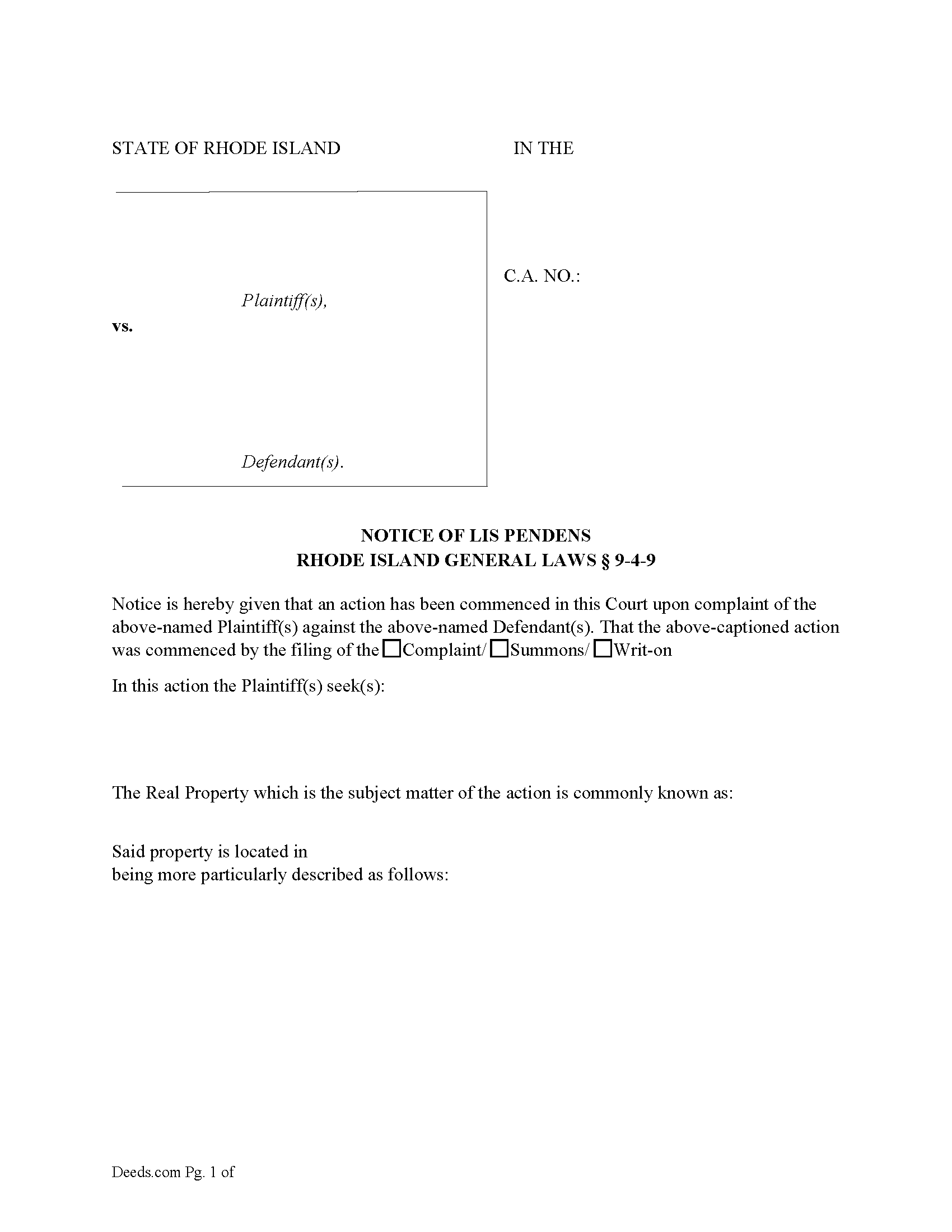
This form is used by the plaintiff or plaintiff's representative. A Notice of Lis Pendens gives notice that an existing court case is ongoing involving specific real property. Once recorded it gives notice to any future purchaser, lender, etc. that they are beholden to the outcome of the pending court case. In Rhode Island a plaintiff can file a lis pendens notice without court approval. For such notice the subject case must concern (the title to any real estate, in this state, or to any interest or easement therein) (Rhode Island General Laws 9-4-9(a)).
(Any person causing such notice to be recorded shall, within seven (7) days of the recording, cause a copy of said notice to be mailed, regular mail, postage prepaid to all parties named in the bill, petition, declaration or other complaint, rule, order, decree, or judgment at their last known address. Failure to comply with this provision shall not invalidate the lis pendens) ((Rhode Island General Laws 9-4-9(b)).
Included is Rhode Island Superior Court "Certificate of Service Form", for use when Superior Court Rules of Civil Procedure requires service of a document to be certified by an attorney of record or a self-represe... More Information about the Rhode Island Notice of Lis Pendens - R.I. General Laws 9-4-9
Notice of Release of Lis Pendens
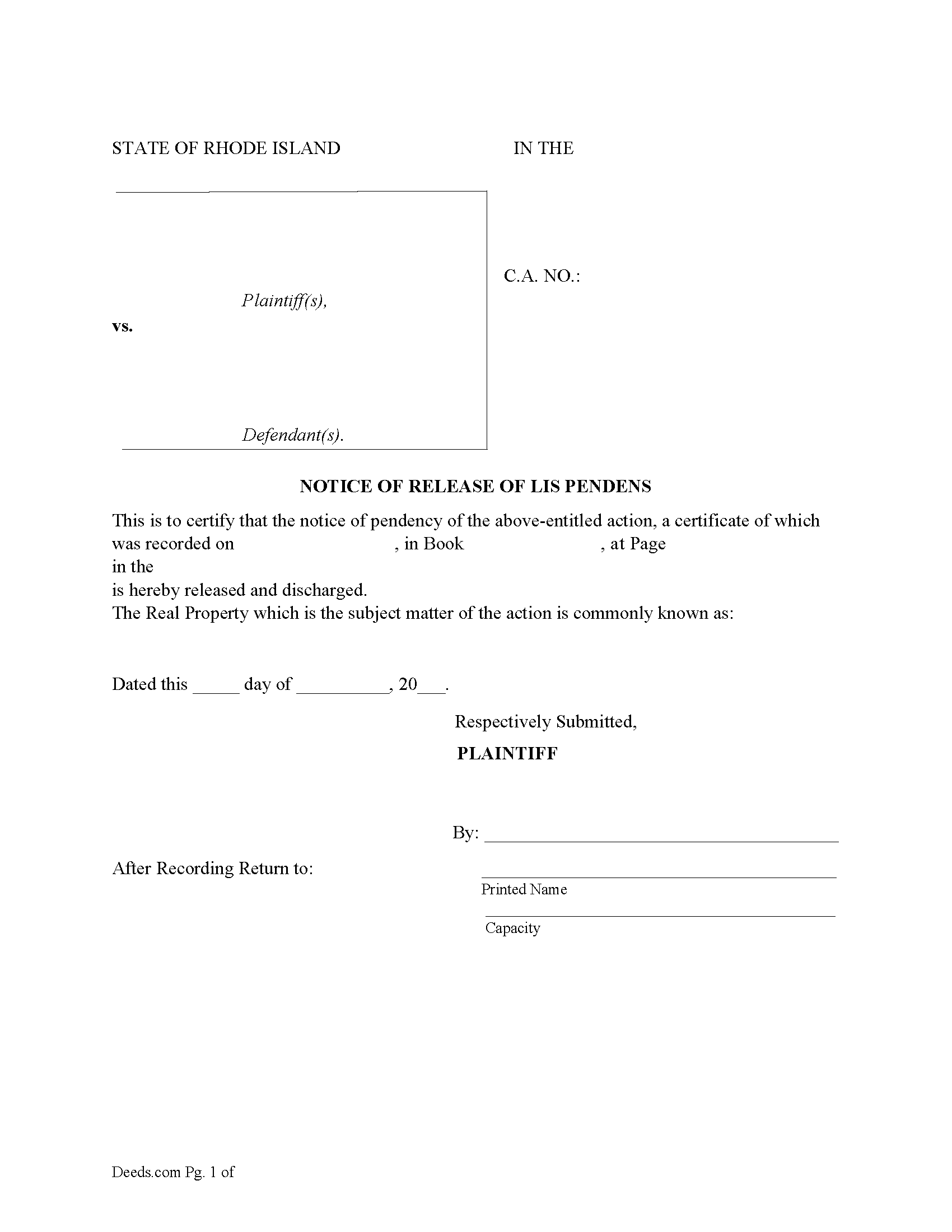
This form is used by the plaintiff or plaintiff's representative to release/discharge a previously recorded Lis Pendens document.
Included is Rhode Island Superior Court "Certificate of Service Form", for use when Superior Court Rules of Civil Procedure requires service of a document to be certified by an attorney of record or a self-represented litigant.
(Rhode Island Release of LP Package includes form, guidelines, and completed example) For use in Rhode Island only.
... More Information about the Rhode Island Notice of Release of Lis Pendens
Trustee Deed
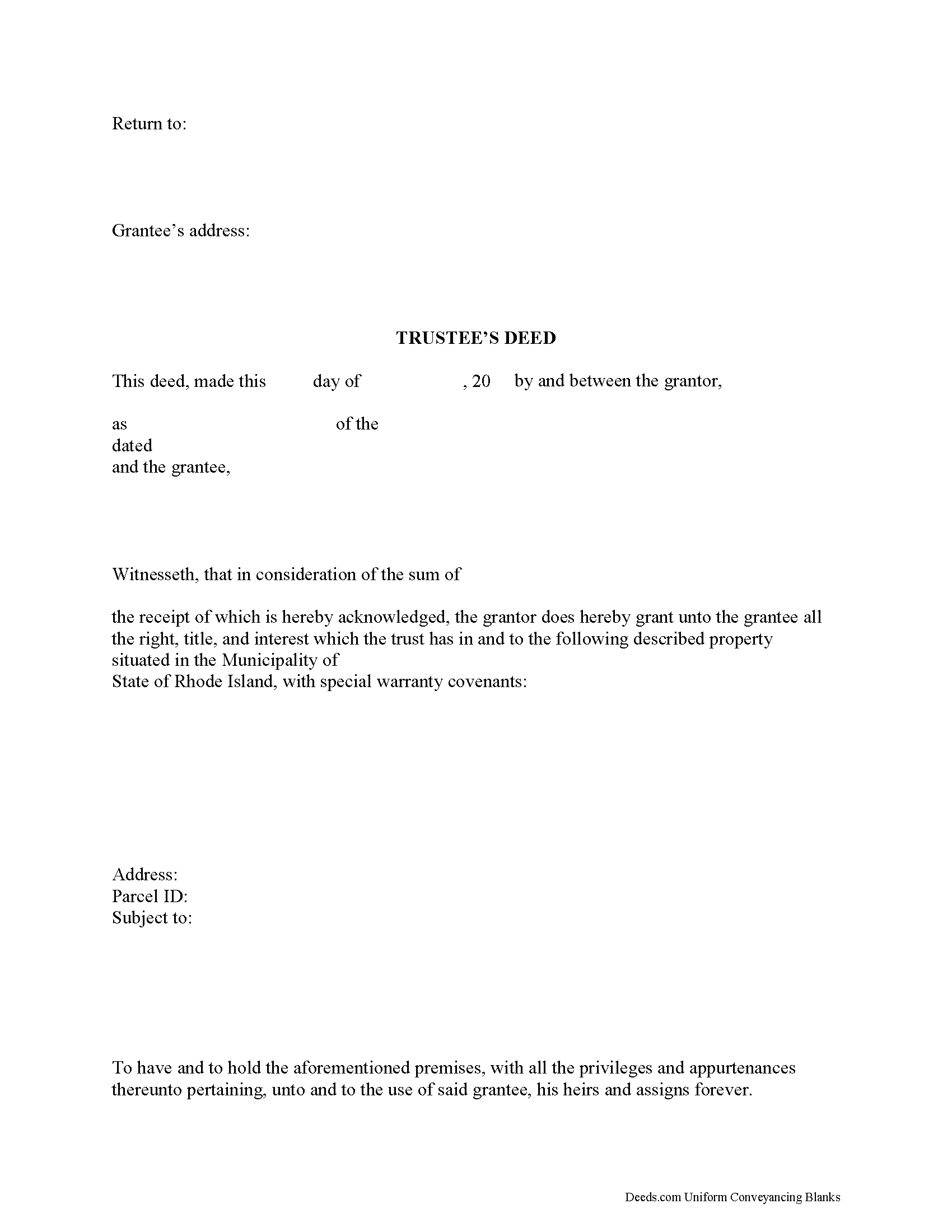
Transferring real property from a living trust requires a trustee's deed. Executed by a trustee, the deed is named for the granting party rather than for the type of warranty the deed offers (as with a warranty deed). It is codified at R.I.G.L. 34-11-12(3).
In a living trust, a settlor transfers assets to a trustee, who holds and manages the property for the benefit of a third party (the trust beneficiary). Transfer of real property into the trust is generally completed by a deed executed by the settlor and naming the trustee as grantee.
In order to convey real property from the trust, the trustee acts on powers granted to him by the settlor in the trust instrument. Most trust instruments include a general power of sale, and trustees in Rhode Island may act on their power to sell pursuant to the terms of the trust instrument and R.I.G.L. 18-4-4. Transfers of real property out of trust require an accompanying affidavit or memorandum of trust under R.I.G.L. 34-4-27 confirming the trustee's authority to convey interest in real property held in trust.
Most deeds in Rhode Island fall under one of two categories. Offering a broad level of warranty, a warranty deed contains w... More Information about the Rhode Island Trustee Deed
Administrator Deed
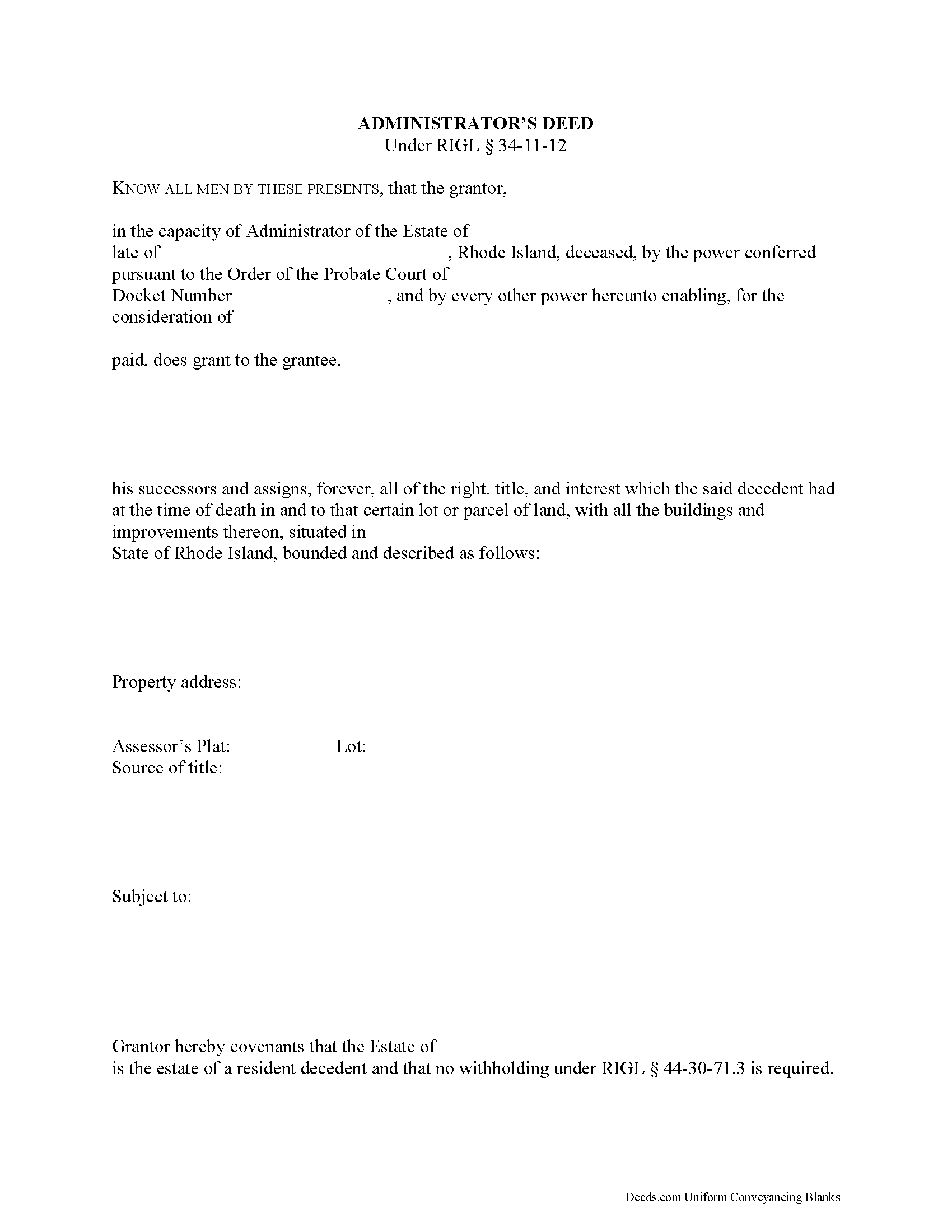
An administrator's deed is a statutory form under RIGL 34-11-12 for sales of real property from a probated estate. An administrator is a court-appointed fiduciary entrusted to administer a decedent's estate. He or she is the personal representative selected by the probate court when the decedent dies without a will, or the executor named in the will is unwilling or unable to serve.
Use an administrator's deed to transfer title to a purchaser with implied fiduciary covenants. Administrator's deeds contain covenants that the grantor is the duly qualified and acting administrator of the estate, that he or she has good right and lawful authority to convey the decedent's interest in the subject property, and that he or she, in his or her capacity, has given bond as required by law and has complied in all respects with the court's decree.
In Rhode Island, the probate court must authorize sales of realty from the estate (RIGL 33-19-3). Prior to the sale, the administrator files a petition for the sale of real estate with the court, which must include the reason for the sale. Valid reasons for petitioning for the sale of real property under RIGL 33-12-6 include enabling the payment ... More Information about the Rhode Island Administrator Deed
Executor Deed
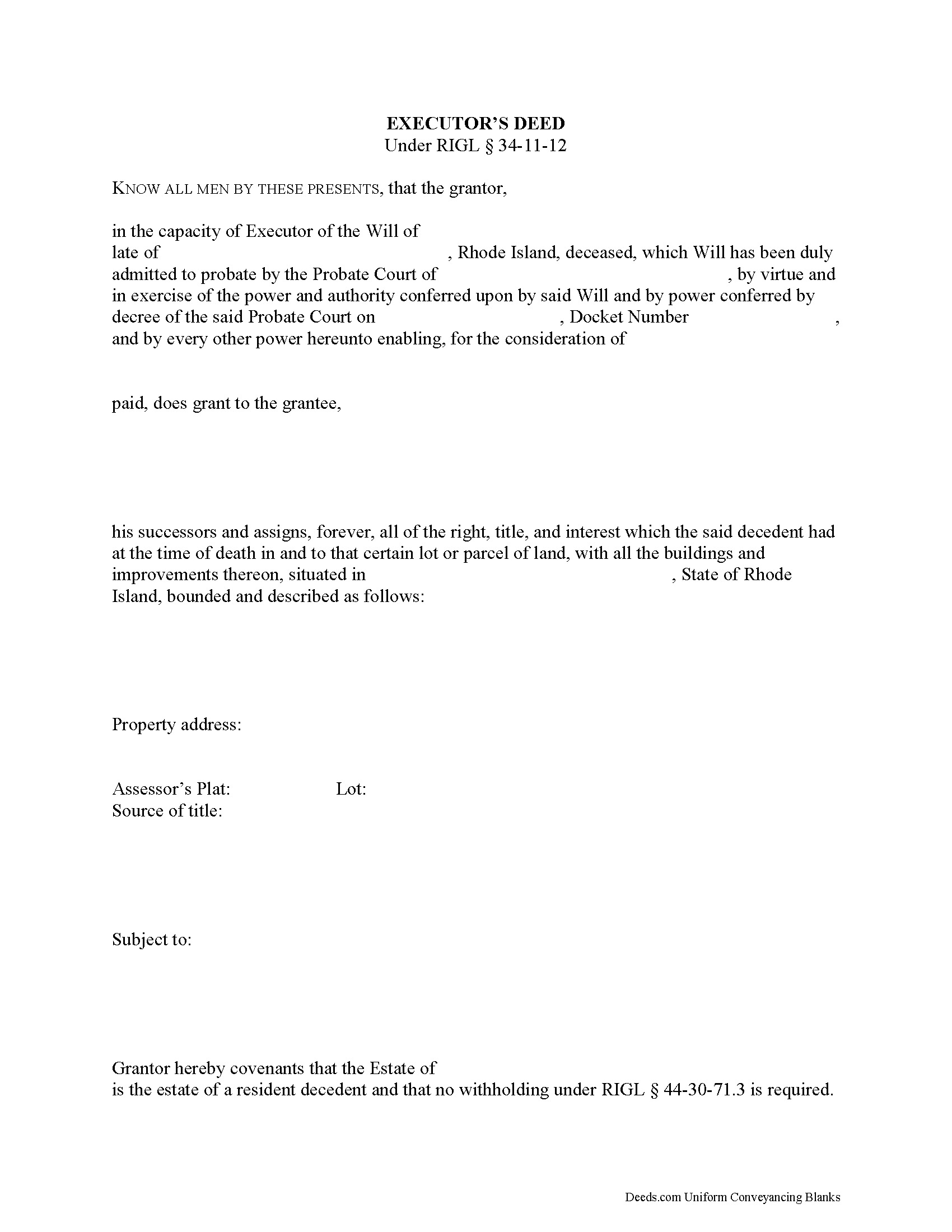
An executor's deed is a statutory form under RIGL 34-11-12 for sales of real property from a probated estate. An executor is a court-appointed fiduciary entrusted to administer a decedent's estate. He or she is the personal representative named in the decedent's will.
Use an executor's deed to transfer title to a purchaser with implied fiduciary covenants. Executor's deeds contain covenants that the grantor is the duly qualified and acting executor of the estate, that he or she has good right and lawful authority to convey the decedent's interest in the subject property, and that he or she, in his or her capacity, has given bond as required by law and has complied in all respects with the court's decree.
In Rhode Island, the probate court must authorize sales of realty from the estate (RIGL 33-19-3). Prior to the sale, the executor files a petition for the sale of real estate with the court, which must include the reason for the sale. Valid reasons for petitioning for the sale of real property under RIGL 33-12-6 include enabling the payment of debts or facilitating efficient administration of the estate. This authority excludes sales of real property that is specifically dev... More Information about the Rhode Island Executor Deed
Memorandum of Trust
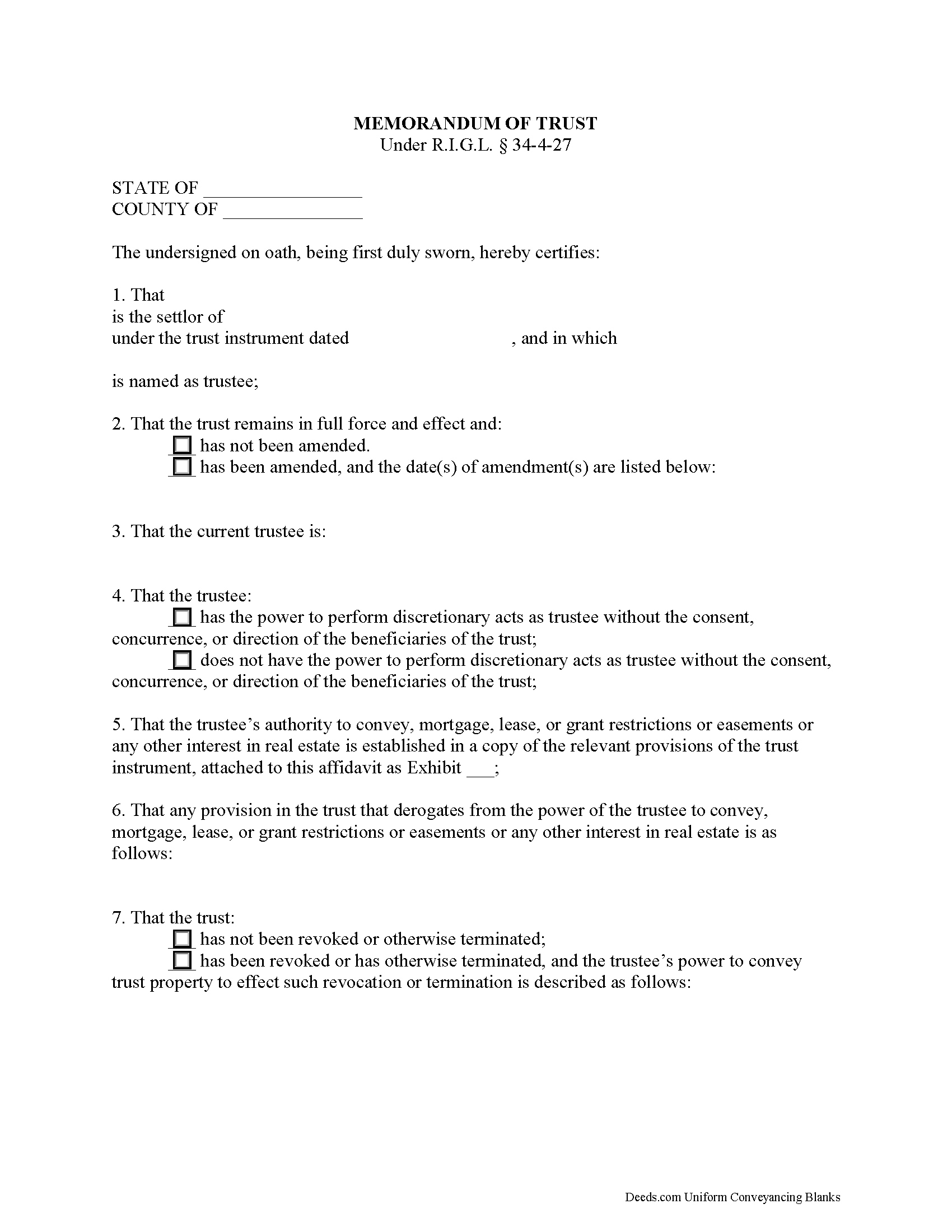
Rhode Island Affidavit or Memorandum of Trust
R.I.G.L. 34-4-27 requires that either the trust agreement or a memorandum of trust be recorded when a trustee conveys real property held in trust. Prior to the ratification of this statute, trustees were required to record the trust instrument -- the document executed by the settlor that designates the trustee, the trust beneficiaries, and the provisions for the trustee's management of trust assets. Now, trustees in Rhode Island have the option to record an affidavit or memorandum of trust, allowing the trust instrument to remain off-record (thereby keeping the settlor's estate plans private to nonessential parties). Third parties (that is, neither the settlor nor the trustee) entering into transactions with a trustee may rely on the statements provided in the affidavit or memorandum of trust as fact.
The affidavit evidences the trustee's authority to convey title to real property held in the trust and acts as a summary of essential terms of the trust instrument. It contains such information as the name, date, settlor, and original trustee of the trust. In addition, it names all currently acting trustees and contains statements a... More Information about the Rhode Island Memorandum of Trust
Disclaimer of Interest
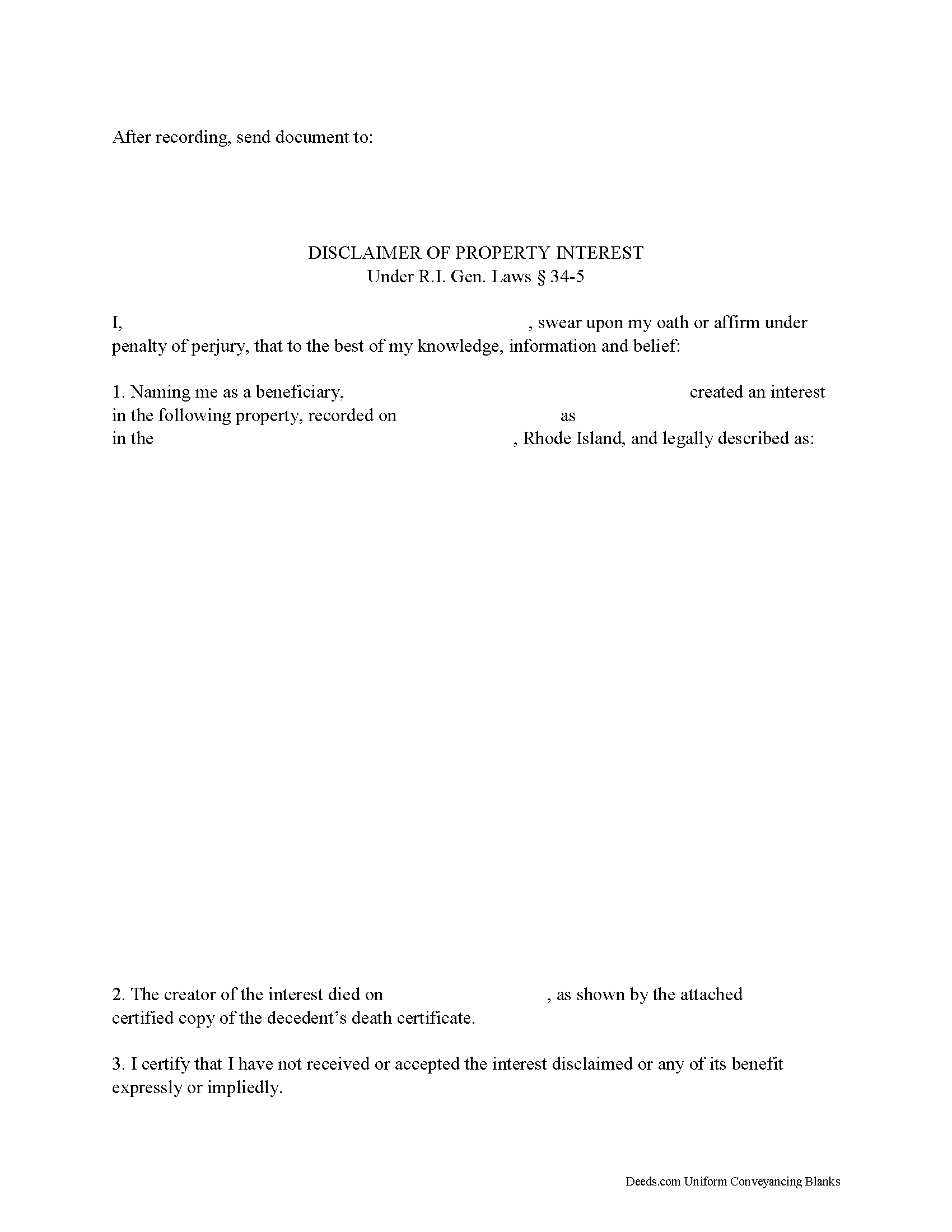
Rhode Island Disclaimer of Property Interest
Under the Rhode Island Statutes, the beneficiary of an interest in property may disclaim the gift, either in part or in full (R.I. Gen. Laws 34-5). Note that the option to disclaim is only available to beneficiaries who have not acted in any way to indicate acceptance or ownership of the interest ( 34-5-9).
The document must be in writing and include a description of the interest, a declaration of intent to disclaim all or a defined portion of the interest, and be signed by the disclaimant ( 34-5-4).
If real property is involved, record the original document or an attested copy within nine months of the transfer (e.g., the death of the creator of the interest) in the office of the person having charge of the recording of deeds in the city or town in which the property is located ( 34-5-6 (a) (2)). This helps to avoid any ambiguity regarding the chain of title. In addition, deliver or mail a copy to the person or entity having legal title or possession of the property ( 34-5-6 (b)).
A disclaimer is irrevocable and binding for the disclaimant and his or her creditors ( 34-5-7), so be sure to consult an attorney when in do... More Information about the Rhode Island Disclaimer of Interest